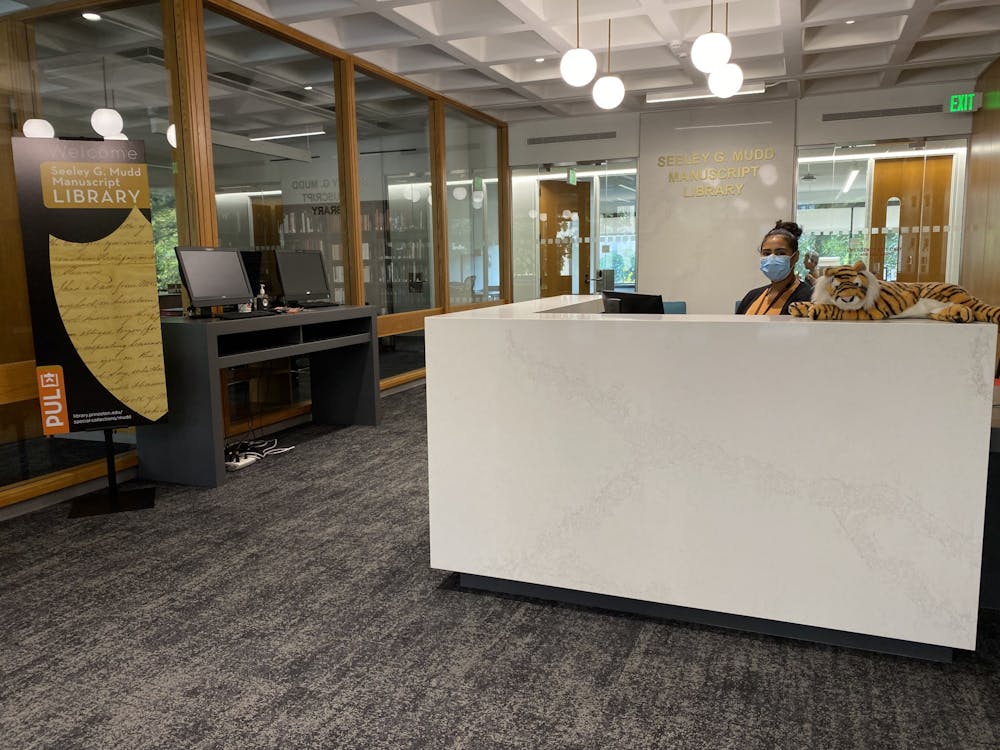After closing for renovations on March 13, 2020, Seeley G. Mudd Manuscript Library reopened this year on Aug. 30. A division of Princeton University Library’s Department of Special Collections, Mudd Library, located at 65 Olden Street, houses the University Archives and the 20th Century Public Policy Papers.
Precipitated by a need to update the fire suppression system, planning for the renovation started over three years ago. According to Assistant University Librarian for Special Collections Public Services Sara Logue in an interview with The Daily Princetonian, the Library was built in 1976 and hadn’t been upgraded significantly since. The renovation was a welcome opportunity to also add a digitization studio and another classroom, and to improve the plumbing, security, environmental controls, electrical systems, accessibility, and cosmetics of the building.
Much of the building remains intact — the ceilings are largely unchanged and much of the wood has been reused from 1976.
“It was important to maintain the overall mid-century feel of the building while working on ways to better utilize the space … what we did improve were the things that help people use the space better,” Logue explained, noting in particular the improvements in accessibility.
Assistant University Librarian for Archives and Records Management Anne Marie Phillips noted accessible front doors and bathrooms, as well as accessible points at the front desk and public computer stations, were added.
The University Archives contained within Mudd go all the way back to the University’s founding in 1746, making environmental controls essential: both humidity and temperature must be kept low to prevent mold growth.
Newer documents require strict controls as well. “We think of paper as being fairly hardy,” Logue explained, “but actually there are certain types of paper from the 20th century that are less hardy than something from 500 years ago.”
Not many undergraduates are visiting yet, but Logue says the library staff expect to see more over the next few months, especially as professors bring their classes and take advantage of the new classroom.

“We’ve always had an effort to target undergraduates in the instruction sessions that we hold and the events that we have had in the past,” Logue said.
Logue noted that there is a mix of professors who use the library, some of whom are consistent visitors and others who visit based on their class needs.
One recurring user of Mudd is School of Public and International Affairs professor Robert Hutchings. In a Freshman Seminar he taught in spring 2020, FRS130: The Cold War and Its Legacy, he and his class were able to look at relevant pieces of history such as George Kennan’s Long Telegram and Allen Dulles’s ID badge from the Office of Strategic Services.
“There’s just something about having the actual physical object in your hand that brings history to life,” he said.

This semester, Hutchings hopes to bring his Freshman Seminar FRS 199: Diplomatic Encounters to Mudd to look at papers from the Wilson presidency, among other artifacts.
Logue says with its particular focus and closed stacks, the Library is oriented more towards classes and researchers than for casual visitors, as compared to Firestone, for example, which has study spaces and open stacks.
Students, however, are welcome to come to pursue their own projects outside of academic requirements. Isabel Rodrigues ’23 is one such student, visiting Mudd to explore recently released archival documents from the tenure of Robert Goheen ’40 as president of the University.
Rodrigues is a Head Copy Editor and Head Podcast Editor for the ‘Prince’.
“It was really interesting to have my own side project,” Rodrigues said in an interview with the ‘Prince.’
“It was a really good way for me to kind of just relax and do some learning or research on my own … I can take an hour out of my day to step back and look at what was there,” she said, contrasting learning for fun in Mudd with the stress of classes and other responsibilities.
To allow remote access to documents, the renovations included the Mudd digital studio, intended to make digitization easier and higher quality.
“We were doing much lower resolution digitization in the past ... Now we have digital cameras, so the resolution is higher, we’re able to capture more for preservation than just for sharing to patrons,” Logue said.
Not everyone will have a use for Mudd Library, but Logue says the librarians strive to make it as easy to use as possible.
“There’s always a reference librarian on duty who would be happy to sit … and start the conversation with someone about their research,” she said. In addition, the catalogue, finding aid database, and “Ask Us” tool are available remotely, along with plenty of digitized documents.
“It really depends on your interests — it’s not for everybody, but it can be for anybody,” Rodrigues said. “Mudd library is maybe the most unique thing at Princeton.”
“We’re excited to be able to be back on campus and help the students, and we’re excited to use our new space,” Logue added.
Hank Ingham is a staff copy editor and news contributor. He can be reached at hingham@princeton.edu.
Editor’s Note: This story has been updated to correct Logue’s title.








